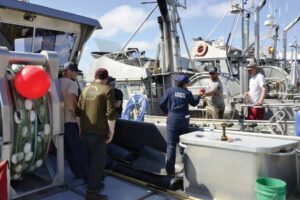
The Coast Guard 17th District Commercial Fishing Vessel Safety office on Oct. 25 reported just the second fatality-free commercial fishing season in Alaska for fiscal year 2022.
The first fatality-free year in the Alaskan fishing industry occurred in 2015, according to the Coast Guard. The statistics are measured in the federal fiscal year, which runs from Oct. 1 through Sept. 30 each year.
An “operational” fatality is defined as a death occurring as a result of an incident at sea, such as a man overboard, a sunken or lost vessel, or an on-deck accident.
“I give most all the credit to the fishing industry when it comes to staying safe and alive,” Scott Wilwert, Commercial Fishing Vessel Safety Coordinator, Coast Guard 17th District, said.
“The efforts of Coast Guard fishing vessel examiners and maritime training organizations like the Alaska Marine Safety Education Association (AMSEA) and the North Pacific Vessel Owners Association (NPFVOA) also play a vital role in preparing fishermen to survive an incident at sea and utilize the equipment they have onboard during an emergency,” he added.
In conjunction with the news, the Coast Guard reminded vessel owners and operators of the importance of properly maintaining their vessel’s lifesaving equipment, ensuring that all crewmembers working on deck are wearing personal floatation devices, and conducting regular shipboard drills to maintain the crew’s proficiency at operating shipboard emergency equipment.
“We definitely want to keep this momentum going through calendar year 2022 and beyond,” Wilwert said. “The linear trend of operational fatalities in the commercial fishing industry in Alaska has been steadily downward and we want to continue to work with the industry to keep it that way.”
“Dangers are ever present in the fishing industry and are the reason we’re encouraging mariners to remain vigilant when it comes to crew training and safety,” he remarked.
The Coast Guard is also encouraging owners and operators to review and be knowledgeable of the general maintenance and upkeep of their vessels. Minor hull leaks and machinery failures should be properly repaired and documented.
“Vessel operators need to be fully aware of the operating constraints that may pertain to their vessels, including awareness of the risks of both overloading a vessel, icing and operating outside the restrictions of their stability letters as well as the crew’s ability,” the Guard said in a statement.
Dockside safety exams became mandatory in 2015 for vessels operating beyond three nautical miles from the territorial sea baseline.
